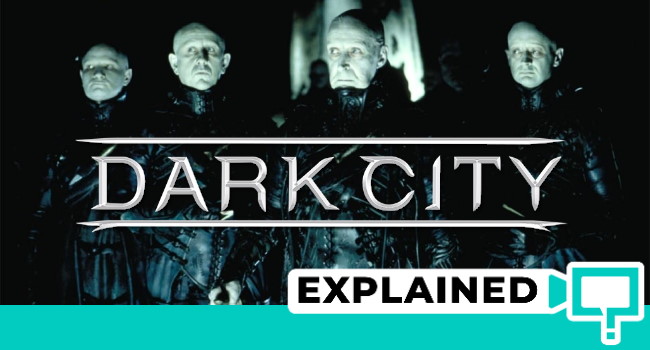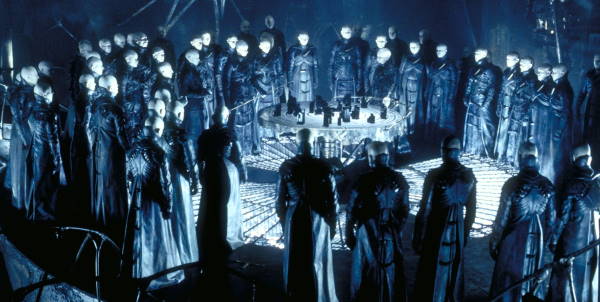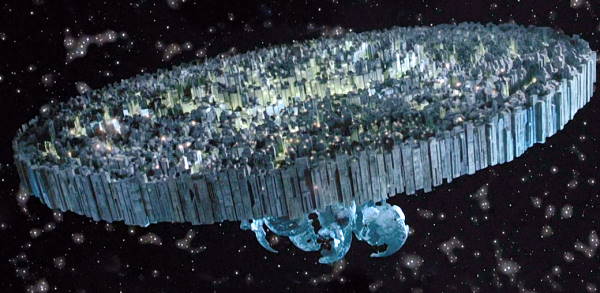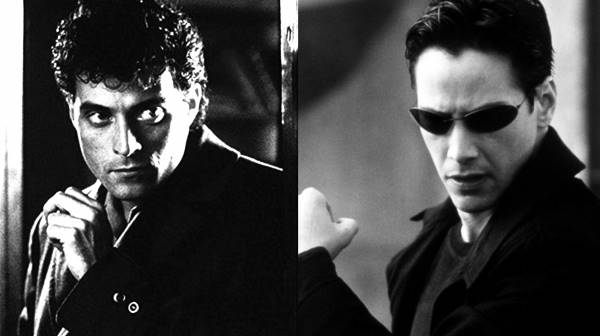What would you get if The Matrix was a lot less Sci-Fi and a lot more noir? What if the agents looked like Pinhead from Hellraiser? What would be the result? Probably something quite close to 1998’s Dark City. No, this doesn’t mean that the movie is a knockoff. If anything, it was released a year before The Matrix, which makes it a predecessor. All in all, it’s a brilliant piece of cinema, simultaneously redefining and subverting the psychological sci-fi genre. Now, let’s delve a bit deeper into what it all means. Here’s the plot, themes and ending of Dark City explained; spoilers ahead.
Hollywordle – Check out my new Hollywood Wordle game! Where To Watch? To find where to stream any movie or series based on your country, use This Is Barry’s Where To Watch. Oh, and if this article doesn’t answer all of your questions, drop me a comment or an FB chat message, and I’ll get you the answer. You can find other film explanations using the search option on top of the site.
Contents
Here are links to the key aspects of the movie:
- – Plot Explained In Short
- – Ending Explained In Short
- – Did Dark City Influence The Matrix?
- – Orwellian Approach to Memory
- – Innovation in the Sci-Fi Genre
- – Final Thoughts
Dark City: Plot Explained In Short
The story takes place in a fictional city of unclear location (or even era). The protagonist, John Murdock, wakes up in a strange hotel with a dead woman lying nearby with no clear recollection of the events leading up to that point. Despite your initial expectations, it’s not yet another approach to American Psycho.
After a brief investigation and escape from law enforcement, he discovers the horrible truth. The city itself is not real but a construct floating in space, akin to a lab-like space station. The memories of all the people there are not real but fabricated by a race of parasite-like aliens to observe how humans act to blend in more effectively and, eventually, take over.
The aliens themselves inhabit the bodies of recently deceased humans, which gives them the hellraiser-like look we’ve mentioned in the introduction. All are pale and completely hairless, probably due to their recently deceased status. They’re also hurt by light (which is why it’s always night) and by water (which is why there are no bodies of water like Shell Beach, and all water-related experiences are merely a fabrication). Most importantly, they’re entirely telepathic.
Seeing as how they had a limited body sample, they had to radicalize the methodology of their experiments. To see how different personality types would act under different circumstances, they swap people’s memories amongst themselves every night.
Dark City: Ending Explained In Short
The ending of Dark City shows that, ironically, while the aliens were trying to learn from humans, John managed to master their telepathic ability (tuning), a skill he uses to stand up to them and overthrows them.
Did Dark City Influence The Matrix?
It’s hard to say for sure, but it does look like it. Dark City also predates movies like eXistenZ and The Thirteenth Floor that have similar concepts. The similarities to The Matrix are striking, and the parallels are too strong and numerous to ignore. It would be fair to say that Dark City is The Matrix in the analog instead of the digital world. Now, some ask the question of whether Dark City is cyberpunk. Truth be told, due to its noir setting and the fact that the technology used mostly resembles a clockwork mechanism, it would be more accurate to classify it as steampunk.
Instead of being able to change one’s clothing or residence with a line of code, in Dark City, a complex clockwork mechanism needs to be used. While in The Matrix, agents could find anyone with a content management system, in Dark City, antagonists have to go on an old-fashioned search.
Dr Daniel Schreber is a character with a striking resemblance to Morpheus from The Matrix. The path down the rabbit hole starts with a phone call from Schreber. He’s the one who red-pills John about reality. In The Matrix, martial arts are uploaded into Neo’s consciousness, while here, the same happens with a slight difference in that a disk is replaced with a syringe.
Mr Hand, an alien injected with John’s memories, clearly resembles Agent Smith – an antagonist gone rogue/independent after an experience-sharing moment with the protagonist.
In the end, John triumphs by realizing that it’s all an illusion and that he can alter reality with his mind – the analogy to The Matrix doesn’t get any clearer. Just bear in mind that Dark City came out a year before. Make of it what you will.
That said, the significant difference between the films was in the execution. The ‘what’ and the ‘how’ presented by The Matrix were far too first-person; people walked out of cinema halls questioning their own realities, and till today there isn’t any answer to – “Are we living inside a simulation?”.
Orwellian Approach to the Concept of Memory
Another thing worth addressing here is the Orwellian approach to the concept of memory. Sure, one might argue that George Orwell (both in Animal Farm and 1984) had a more realistic approach. The officials shift the narrative, the news media start spinning it, and soon everyone forgets the ‘previous version of the truth’. Here, it’s all done with a hypnotic-like method and syringes. The result, nonetheless, is quite the same.
Truth is a philosophical concept, and our memories tend to be quite unreliable. We often misinterpret things that happen or fill in memories as we go. The chances are that ten years later, one won’t remember an event exactly as it happened. What Orwell explored was – what if there was some sort of malicious higher power willing to exploit this psychological phenomenon? Coincidentally, this is the central theme of Dark City, as well.
Another Orwellian motif can be seen in the fact that the aliens are so fascinated with human individuality since it’s a completely foreign concept to them. From all we can tell, these aliens are closer to hive-mind conscience. Sure, some of them express individuality, but we have no way of telling if this is a mental feature they developed recently (under the influence of the experiment). If there’s one thing that Orwell tried to warn us about, it’s the fact that authoritarian societies try to stem individuality by any means necessary.
Innovation in the Sci-Fi Genre
The truth is that, as Science Fiction, this movie stands out in many different narrative methods. On the one hand, the setting is modern, but it uses steampunk technology rather than cyberpunk. There’s telepathy, but it needs clockwork-like technology to be amplified. While some would characterize this as weird (perhaps even out of place), one cannot deny that it makes the setting more unique.
The characterization is spot on. Antagonists are motivated, the heroes are flawed, and there are so many great examples of the ‘show but do not tell’ method. For instance, the experiment itself is not motivated by some sick fantasy or sadistic alien race (a common Sci-Fi trope). Instead, it’s hinted (rather outright mentioned) that the aliens are dying and that they need to learn to blend in with humans to survive. Even when an alien deliberately engages in murder, it’s seemingly because he’s already infused with a murderer personality. The desire to learn so that they can survive as a species is an incredibly well-grounded motivation that is, sadly, absent in many other sci-fi movies.
Then, the movie raises some deep philosophical questions. Sure, they are looking for an answer to questions about human personality, but the aliens deliberately phrase this mystery as a – quest for the human soul. They want to try and figure out what comes first – our temperament or external conditions.
What would happen if they gave the same life to a completely different person? What if they gave someone with this personality type a completely different life? These are all questions we humans have been trying to answer for millennia. Perhaps the very fact that they’re asking them brings us closer to the answer than they realize.
Dark City: Final Thoughts
In the end, Dark City is one of its generation’s most incredible, innovative, groundbreaking, and, sadly, overlooked movies. The Matrix didn’t straight out copy Dark City but used many of the same themes and ideas. Lastly, both movies were filmed in Australia, which is why they often used the same set. If you haven’t seen it already, it’s definitely worth your time.

Stacey is a talented freelance writer passionate about all things pop culture. She has a keen eye for detail and a natural talent for storytelling. She’s a super-fan of Game of Thrones, Cats, and Indie Rock Music and can often be found engrossed in complex films and books. Connect with her on her social media handles to learn more about her work and interests.




